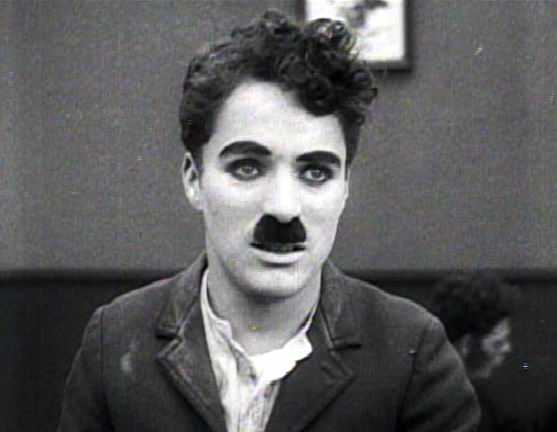Charlie Chaplin Filmography Continued
KEYSTONE ESSANAY FIRST NATIONAL UNITED ARTISTS
M U T U A L S
The Floorwalker
1917 - 2 reels - 24 min.
Charles Chaplin launched his $670,000 contract with the Mutual Film
Corporation with the hilarious The Floorwalker. The film's chief comedic
device, the store escalator,
was inspired by Chaplin's visit to
where, at an elevated train station, he saw a minor accident involving one.
The manager of the store receives a letter - his superiors are coming to
investigate him. He's been skimming money from the store, in cahoots with
the bossy and mean floorwalker who bears a striking resemblance to Charlie.
The pair decide they're going to take off with the cash, and begin emptying
the safe in the office upstairs. Meanwhile, Charlie comes wandering in to
the store, trying out everything but buying nothing. The store seems to be
infested with shoplifters and store detectives. Charlie gets caught by one
of the latter when he tries to buy a display rack. He escapes upstairs
where he encounters his doppelganger who has just knocked out the manager
and is escaping with a suitcase full of money. The look-alikes do the
classic mirror routine, copied later by the Marx Brothers in Duck Soup.
They agree to exchange clothes and identities, but the real floorwalker is
arrested as the Tramp, leaving behind the satchel full of loot. Charlie
takes over the floorwalker's duties, getting involved with various
customers, especially the ladies in the shoe department. When Charlie finds
the case he's ecstatic, until
crooked partner, begins a merry chase up and down the escalator and all
around the store, hampered only by the ever vigilant store detectives. The
real floorwalker returns in custody and comes clean, implicating the
manager. The chase continues until Charlie is caught in the elevator by a
detective as it descends upon the head of Campbell who is also apprehended.
Cast
Charles Chaplin - The New Floorwalker
Eric Campbell - Store Manager
Edna Purviance - His Secretary
Lloyd Bacon - Floorwalker
Albert Austin - Shop Assistant
James T. Kelly - Lift Boy
Charlotte Mineau - Beautiful Store Detective
Leo White - Customer and Shoplifter
Tom Nelson - Detective
Frank J. Coleman - Man in Store
Production Team
Charles Chaplin - Director, Producer, Screenwriter
Vincent Bryan - Screenwriter
William C. Foster - Cinematographer
Roland H. "Rollie" Totheroh - Assistant Cinematographer
The Fireman
1916 - 24 min.
In his second Mutual two-reeler,Charlie Chaplin is an inept fireman,
responsible for hitching up the horses when an alarm comes in. He sleeps
through the drill alarm and his boss, Eric Campbell, treats him roughly,
kicking the seat of his pants at every opportunity, which gets him a salute
from Charlie every time. Soon the firehouse is visited by the Chief's
sweetheart, Edna Purviance and her father. Charlie is clearly enamoured
but Edna is only bemused. The father takes the Chief aside and confirms a
deal they have in which the Chief will ignore a fire signal when the Father
burns down his house for the insurance money. In return the Chief will get
Edna's hand in marriage. After Chief, father and daughter leave together, a
real alarm comes in. The owner of the burning house, Leo White, is
frantic. He rings in the alarm but Charlie, engrossed in a checkers game,
stuffs a rag between the clapper and bell. When the victim calls in,
Charlie unwittingly pulls out the phone cable. The man finally shows up at
the firehouse screaming "Fire!!", but Charlie calms him down, handing him a
magazine, saying he has to go get his Chief. When the firemen return, the
victim, who has been calmly reading the magazine, remembers what he's doing
there and again erupts in cries of "Fire!!" The fire squad rush to the
scene but Charlie has trouble controlling the powerful hose, and soaks
everyone. Meanwhile, unaware that Edna has gone up to her room, the father
sets the fire in the basement of his townhouse. When Edna's screams bring
him back a moment later, he frantically runs off to the fire station and
then to the site of the other fire. He approaches Charlie who takes the
fire wagon and heads for Edna's with the father in tow. The other Firemen,
more concerned over the loss of their truck than in putting out the first
fire, follow frantically. When Charlie reaches the fire he races up the
face of the building in an amazing feat of climbing and rescues Edna,
carrying her down on his back. Reaching the ground, he collapses and is
tended to by Edna. Sending the others away, she and Charlie and kiss and
wander off arm in arm.
Cast
Charles Chaplin - The Fireman
Eric Campbell - His Chief
Edna Purviance - The Chief's Sweetheart
Lloyd Bacon - Her Father
Albert Austin - Fireman
Frank J. Coleman - Fireman
James T. Kelly - Fireman
John Rand - Fireman
Leo White - Owner of Burning House
Production Team
Charles Chaplin - Director, Producer, Screenwriter
Vincent Bryan - Screenwriter
William C. Foster - Cinematographer
Roland H. "Rollie" Totheroh - Asst. Cinematographer
The Vagabond
1916 - 2 Reels - 25 min.
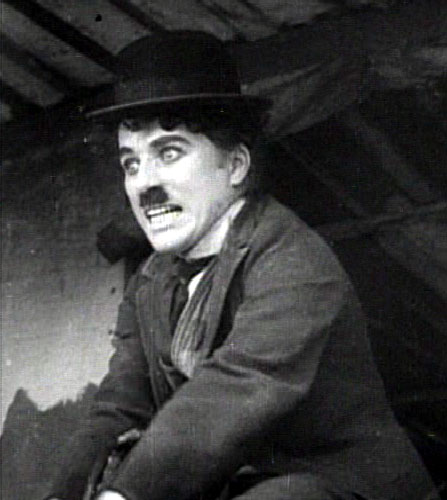
The Dramatic Escape
Charlie Chaplin's third film in his Mutual period is his first minor
masterpiece. It combines comedy and drama in the style that Chaplin had
developed in his earlier Essanay film The Tramp, and anticipates later
dramatic comedies such as The Kid and City Lights. Charlie is an
itinerant violinist whose famous feet we first see emerging from the
swinging doors of a saloon. He takes up his position outside the back door
and begins his concert, but at this moment a street band begins playing
outside the front door. When Charlie enters the saloon to pass the hat, the
patrons, believing he's part of the band, contribute generously. When the
real band leader enters to pass his hat a fight and chase begin from which
Charlie eventually escapes. We are now introduced to "The Mother", an
obviously upper class woman who interrupts her embroidering and looks
longingly at a photograph of her long lost child. Charlie, having forsaken
the city, wanders down a country road where he comes upon a gypsy
encampment where a beautiful drudge Edna Purviance, under the control of
the brutal Gypsy Chief, Eric Campbell, is washing clothes. Charlie plays
a concert for his audience of one, the fast tempo causing her to scrub her
laundry at a lightning pace and his soulful playing evoking her strong
emotions. The concert is interrupted by the Chief who pushes Charlie into a
water basin and beats the girl severely for shirking her duties. Seeing
this brutality, Charlie puts aside his cane and violin in favor of a stout
club and rescues the girl in an exciting scene in which they dramatically
escape in one of the wagons. Later, encamped by the side of a road,
Charlie prepares breakfast while Edna goes for water. She meets a handsome
artist, Lloyd Bacon, who, noticing a shamrock shaped birthmark on Edna's
arm, asks her to pose for him. After finishing his sketch she invites him
to breakfast. During the meal it's obvious from her face that she's
infatuated with him and Charlie is aware that he's losing her. When the
artist leaves, Edna gazes longingly after him as Charlie watches her
apprehensively. Some time later the painting is exhibited in a posh gallery
and the Mother, in attendance, almost collapses as she recognizes her
daughter by her birthmark. Meanwhile Charlie tries to cheer up the
despondent Edna by promising that he'll learn to draw too. Suddenly a
limousine pulls up and mother and daughter are reunited. Charlie gallantly
refuses a cash reward and wishes the artist luck just before they drive
off. Alone, Charlie tries to cheer himself but succumbs to his emotions. In
the limousine Edna realizes her true feelings and makes the driver return
to Charlie, whom she excitedly hauls off to the limousine and to a presumed
life of luxury. This was not the ending originally planned for the film,
in which Chaplin was going to have the Tramp attempt a drowning suicide,
only to be rescued by a homely farm girl, and seeing her, jumping back in
again. Fortunately he opted for the happier, more optimistic ending.
Cast
Charles Chaplin - The Saloon Violinist
Edna Purviance - The Gypsy Drudge
Eric Campbell - The Gypsy Chief
Charlotte Mineau - Girl's Mother
Lloyd Bacon - Artist
Albert Austin - Trombonist
Frank J. Coleman - Gypsy and Musician
James T. Kelly - Gypsy and Musician
John Rand - Trumpeter, Band Leader
Leo White - Old Jew and Gypsy Woman
Production Team
Charles Chaplin - Director, Producer, Screenwriter
Vincent Bryan - Screenwriter
William C. Foster - Cinematographer
Roland H. "Rollie" Totheroh - Cinematographer
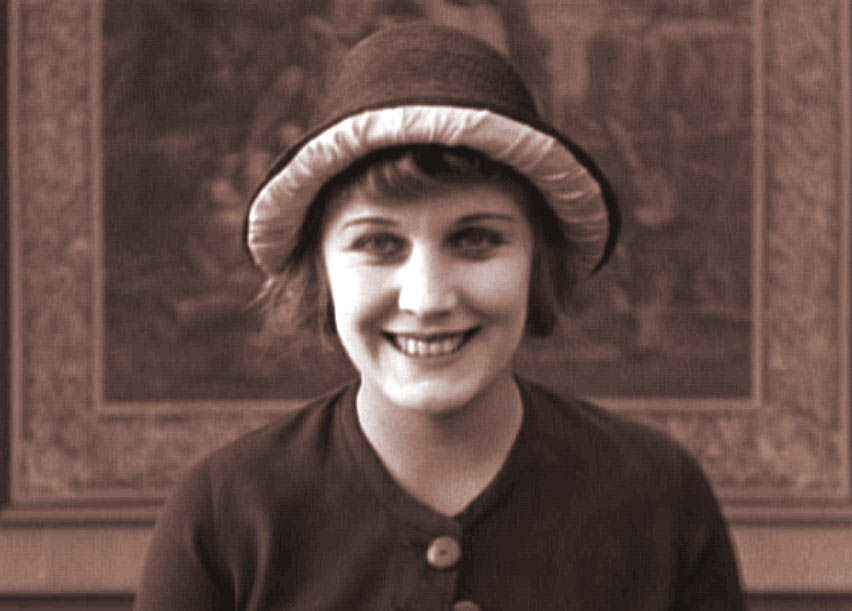
Edna Purviance - A costume test for The Vagabond
One A.M.
1916 - 20 min.
Charlie Chaplin's fourth film for Mutual is a tour de force solo
performance, with Chaplin playing his classic drunk, returning home in the
wee hours. The only other character in the film is the taxi driver who is
oblivious to Charlie's difficulties getting out of the cab and receives a
lit cigarette in his outstretched palm. Charlie has equal problems getting
into his house. He can't find his key and enters via a window, but soon
finds his key in his vest pocket and exits via the window, reentering in
the proper way, through the door. His house is filled with inanimate
objects which to his mind are ganging up against him. The stuffed animals
seem to attack him, he slides on throw rugs along the slippery floor, tries
to reach a liquor bottle on a revolving table that keeps eluding him. When
he attempts to climb the stairs he is repeatedly struck by the oversized
pendulum of a wall clock and sent tumbling down the staircase. Finally
reaching his bedroom, his automatic Murphy bed seems to have a mind of its
own, trapping him as it revolves round and round inside its wall
compartment, bucking him like a bronco when he sits on it, and falling on
top of him when he lays on the floor. Finally abandoning the bedroom,
Charlie goes to the bathroom, soaking himself as he tries to get a drink
from the shower stall and then settling down for the night in the bathtub.
Although essentially plotless One A.M. is a brilliant clinic in physical
comedy and the psychology of alcoholic delusions.
Cast
Charles Chaplin - Drunk
Albert Austin - Taxi Driver
Production Team
Charles Chaplin - Producer, Director, Screenwriter
Roland H. "Rollie" Totheroh - Cinematographer
The Count
1916 - 24 min.
In his fifth film for Mutual Charlie Chaplin returns to his often used
theme of imposture, which had begun as early as his 1914 film Caught in a
Cabaret, and was expanded upon later in The Idle Class and with his
Jewish Barber/Hitler characters in The Great Dictator. In The Count
Charlie is a tailor's apprentice who, attempting to measure a female
customer, is too shy to measure the more personal areas and instead
measures her ear, nose and finger. Fired for burning holes in layers of
clothing with a hot iron, Charlie repairs to the Moneybags mansion where he
can get a free meal from his lady friend who is the cook there.
Meanwhile, the Tailor (Eric Campbell) has found a note in the pocket of a
customer's coat. It is from a count who declines an invitation to Mrs.
Moneybags' party. He dresses up in his finest evening clothes, deciding to
impersonate the count and perhaps ingratiate himself with the Moneybags'
beautiful daughter (Edna Purviance). Charlie, eating limburger cheese
under the admiring eye of the cook is almost caught when the butler comes
into the kitchen, but hides in the garbage basket along with the
objectionably malodorous cheese. When the cook's other paramour, a cop,
comes in to visit, Charlie escapes into the dumbwaiter. Emerging in the
vestibule he catches Eric, who has just arrived. When they make their
entrance into the dining room, it is Charlie who assumes the role of the
count, introducing Eric as his secretary. As many of the guests are in
costume, Charlie's outfit goes unremarked upon. During lunch, Eric's loud
soup slurping prevents Charlie from hearing Edna's conversation. Charlie's
table manners are equally suspect as he ties a cloth napkin around his head
to protect his ears from the juice of the watermelon he is eating. Soon the
ball begins and Charlie dominates Edna's dance schedule. His dancing
creates quite a sensation, despite the slippery waxed floor, allowing
Chaplin to display his comical dance splits and to engage in some
infighting with the disgruntled Eric. A beautiful and exotic female guest
temporarily distracts him, and in the parlor he expresses his sexual fervor
by performing some rather suggestive acts with his cane and a large stuffed
turkey. When he starts swatting other foodstuff into the adjoining ballroom
hitting a number of the guests, the men challenge him and a chase begins.
Just then the real count arrives, and learning of the imposture calls the
police who join in the fray. Finally Eric is arrested, but the slippery
Charlie makes his escape, running down the sidewalk and off into the
distance.
Cast
Charles Chaplin - Tailor's Apprentice
Eric Campbell - Tailor
Edna Purviance - Miss Moneybags, Heiress
Albert Austin - Guest
Frank J. Coleman - Policeman and Guest
James
T. Kelly -
Charlotte Mineau - Mrs Moneybags
Lloyd Bacon - Band Leader
May White - Guest
? - Girl
John Rand - Guest
Eva Thatcher - Cook
Loyal Underwood - Small Guest
Leo White - Count Broko
Production Team
Charles Chaplin - Director, Producer, Screenwriter
Roland H. "Rollie" Totheroh - Cinematographer
The Pawnshop
1916 - 25 min.
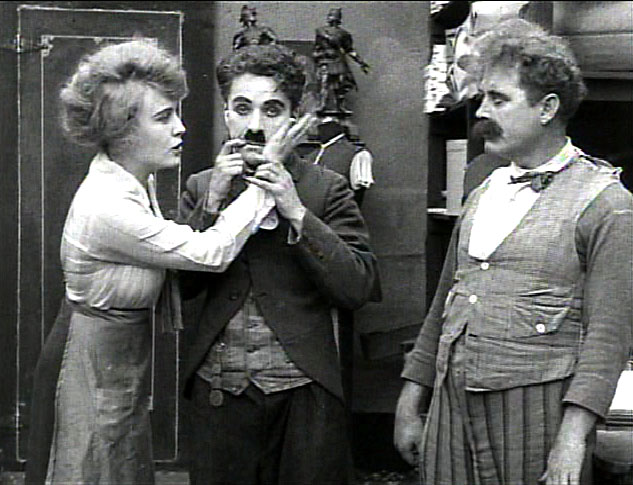
Charlie Chaplin's sixth film for the Mutual Film Corporation is a marvel of
sight gags, comic transformations and brilliant pantomime. Charlie plays
an assistant in a pawnshop, where he arrives late for work and is scolded
by the portly Pawnbroker, played by Henry Bergman in his first role in a
Chaplin film. Bergman was to go on to play in most of the Chaplin films
through Modern Times, also filling the roles of Assistant Director,
gagman and confidant.
Charlie annoys his rival employee (John Rand) with
his dusting and a series of conflicts between them arise. They must go
outside and clean the store
front, and Charlie, trapping
rungs of a ladder performs a ballet-like boxing scene, striking his
helpless opponent until a cop arrives on the scene, whereupon Charlie's
movements become the most graceful of dances. Cleaning the metal pawnshop
balls and shop sign atop the ladder, Charlie rocks back and forth on the
ladder, finally tumbling down as gracefully as any circus acrobat. Back
inside the shop their fight escalates until the Pawnbroker enters and
angrily discharges Charlie. The little fellow's heart breaking pleas for
forgiveness, during which he mimes that he has many children ranging in
height from about two to seven feet, cause the boss to relent. Alone again,
Charlie renews his attack on Rand with vigor, but just as he's about to
deliver the coup de grace, Edna, the boss' daughter enters from the back
room curious as to the commotion. Charlie swiftly lays down on the floor
and Edna scolds the near unconscious
patting Charlie's cheek as he admires her figure. She takes him into the
kitchen and gives him a doughnut, which Chaplin's wonderful pantomime
ability makes us believe weighs twenty pounds, as he exercises with it as
if it were a dumbbell. He helps with the dishes (drying them in a hand
clothes wringer) and with the
baking. When
but hearing the racket the boss comes in and Charlie quickly resumes his
role as baker, then goes to the safe to retrieve his lunch.
Manning the shop counter, Charlie encounters three customers, the first an
old actor wanting to pawn his late wife's ring for five dollars. His histrionics
touch Charlie deeply. He gives the bereaved man ten dollars from the till
and the ring back as well. When the man offers to gives Charlie change and
pulls out huge wad of bills, Charlie knows he's been had. Soon a well
dressed crook (Eric Campbell) shows up and is taken into the back room by
the boss to be shown some diamonds. Meanwhile another customer arrives
wishing to pawn an alarm clock. In a long, brilliant scene of comic
transformations, better seen than described, Charlie becomes surgeon,
jeweller, ribbon clerk and mechanic as he dismantles and destroys the clock
to the total amazement of the customer, Albert Austin. Gathering the
detritus of the ruined timepiece
and sweeping them into
Charlie rejects the item, sending the protesting customer packing with a
blow from a rubber hammer. His next customer is a lady with a bowl of
goldfish, which Charlie tests for authenticity by pouring muriatic acid
(the famous "acid test") into the bowl. The boss emerges out from his
conference and he sends the lady away. Meanwhile Charlie and Rand are at it
again, and a flying wad of dough catches both boss and crook in the face.
The boss chases Charlie from the kitchen, whereupon Charlie hides in a
trunk to avoid punishment. Just then the crook emerges from the safe, gun
drawn, stolen diamonds under his arm and holds the others at bay. Charlie
heroically emerges from the trunk, and in balletic movements, smashes the
crook over the head, embraces Edna, receives a pat on the back from the
boss and delivers one final back kick to his rival.
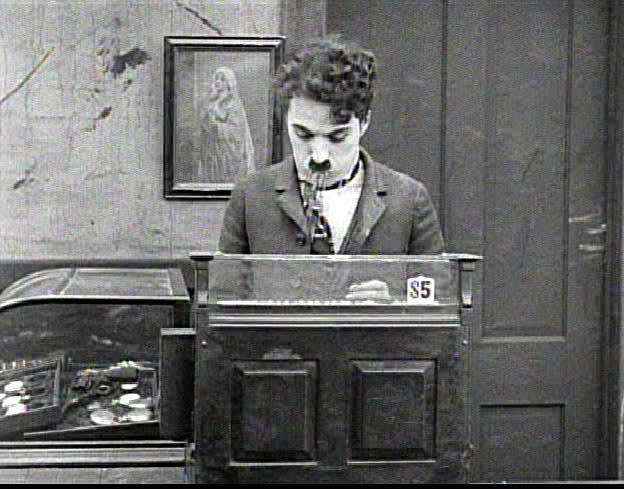
Charlie hocks a loogie into the cash register!
Cast
Charles Chaplin - The New Employee
Henry Bergman - Pawnbroker
Edna Purviance - His Daughter
John Rand - Pawnshop Assistant
Eric Campbell - A Thief
Albert Austin - Customer with Clock
? - An Old Actor (with Ring)
Frank J. Coleman - Policeman
James T. Kelly - Bum and Female Customer with Goldfish
Contrary to prior listings, Wesley Ruggles does not play the Old Actor.
Production Team
Charles Chaplin - Producer, Director
Roland H. "Rollie" Totheroh - Cinematographer
Behind the Screen
1916 - 23 min.
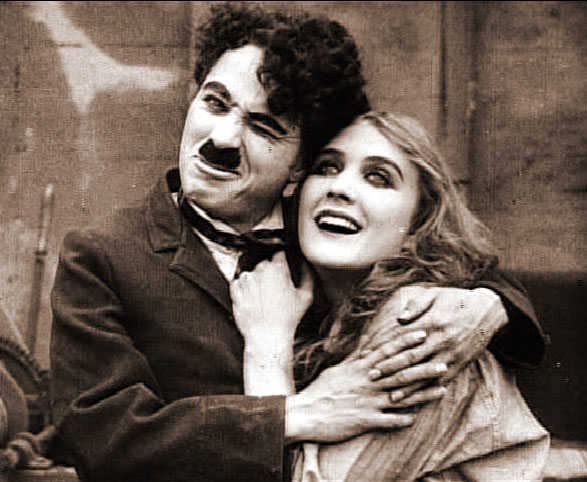
Charlie Chaplin's seventh Lone Star/Mutual release gives another behind
the scenes look at the workings of a movie comedy factory, as had three
earlier films, A Film Johnnie (not written or directed by him), his own
The Masquerader and his first Essanay release, His New Job. As the film
opens a young, innocent girl, Edna Purviance, dressed like a country
bumpkin asks the producer for an acting job. Taking one look, he turns her
down. Chaplin is David, the prop man's assistant, who must do all the heavy
work while his boss sits and lifts his finger only to point. Lifting a
large male sculpture into position, David notices that the gaze of the
statue is directed upon the nude female statue nearby. With a disapproving
look, he moves the offending statue to a more appropriate position. David
is constantly getting in trouble, nearly kicking over the camera tripod
many times, and getting caught resting after particularly strenuous tasks.
One of these is to move eleven wood chairs, which he accomplishes in
amazing Chaplinesque fashion by slinging them all over his shoulder, taking
on the appearance of a porcupine as he carries them across the studio and
picking up a prop upright piano along the way. Putting the final touches on
the set, David grooms a bearskin rug as a barber would a customer.
Lunchtime finds Goliath eating a stack of pies, while the assistant must
satisfy himself with his two slices of bread, between which he sneaks the
occasional bite of a stagehand's beef flank. David then plays an impromptu
concerto on the overturned pie tins, using two bones as mallets. When the
snoozing stagehands are roughly told to get back to work, they are furious
and go on strike. Goliath shows his true colors when he refuses to strike
with the others, brown nosing the producer. David stays on the job too,
mainly because of the retribution he fears from his boss. Meanwhile the
girl has dressed in boy's clothes, hoping to get a job as a replacement
stagehand, which she does. After messing up a dramatic scene by missing his
cue on a trap door, sending everyone down the trap, David finds the "boy"
playing the guitar and singing sweetly. He teases "him" about his
femininity, but discovers she's a girl when she faints upon seeing the
split pants of the director involved in the earlier trap accident. She begs
David not to reveal her secret and he steals a few kisses in the process.
Now they're observed by Goliath, who mocks the apparently gay couple by
mincing about. David and Goliath then get drafted to act in a comedy sketch
involving pies, one of the few times pie throwing is used in a Chaplin
film. Meanwhile the vengeful strikers plan to set off a bomb at the
studio. While David refuses to be hit with the pies and instead hits
Goliath, the director and the actors in an adjacent set, the strikers carry
out their plot. The first bomber is knocked out from behind by Edna, but
the second drops his bomb through the trap door and struggles with Edna who
tries to restrain him. On the comedy set, David is shoved backwards by
Goliath causing him to hit the lever of the trap door, sending Goliath and
the comedy director through the trap. David finds Edna struggling with the
bomber and with a kick dispatches him through the trap as well. Just then
the bomb explodes, collapsing the set. But David gets his reward for saving
the girl, her smiles and kisses.
Cast
Charles Chaplin - David, Property Man's Assistant
Edna Purviance - Girl Seeking Film Job
Eric Campbell - Goliath, Head Property Man
Albert Austin - Stagehand and Actor
Lloyd Bacon - Director of Comedy and Actor
Henry Bergman - Director of History Film
Frank J. Coleman - Producer
James T. Kelly - Cameraman and Stagehand
Charlotte Mineau - Actress
John Rand - Stagehand
Leo White - Stagehand
Tom Wood - Actor
Production Team
Charles Chaplin - Director, Producer
Roland H. "Rollie" Totheroh - Cinematographer
The Rink
1916 - 23 min.
Charlie Chaplin's eighth film for Lone Star/Mutual was also his last for
1916. He was supposed to have completed all twelve of the films called for
in the contract, but had justifiably taken more time with each succeeding
film and would take another ten months to complete the "golden dozen." The
Rink is another of Chaplin's imposture films, in which a lower class
working stiff impersonates a member of the upper crust. It is inspired,
mostly in its setting, by the Fred Karno sketch "Skating", which was
written by his brother Sydney and in which both brothers had starred during
their tenures with Karno's pantomime comedy troupe. The film opens on a
scene of domesticity in which society girl Edna Purviance wakes her
napping father while playing with her kitten which is perched on his
shoulder. Charlie is a waiter in a restaurant. He adds up Mr. Stout's
(Eric Campbell) bill by examining the residue on his tie, shirt and ears.
He gets into trouble with the boss for fighting with the other waiter,
going in the out door and annoying the customers. A romantic quadrangle
begins to form as Edna's father, lunching in Charlie's restaurant,
encounters and flirts with Mrs. Stout (Henry Bergman). Meanwhile Mr.
Stout has gone on to the skating rink where he flirts with and tries to
mash Edna. Charlie, on his lunch break also arrives at the rink and here
begins a virtual ballet on skates. He rescues Edna from Stout's advances,
literally skating circles around him, pulling him down at every
opportunity, creating havoc at the rink and charming Edna in the process.
Outside the rink, Edna invites Charlie to her skating party. He gives her
his calling card, identifying himself as "Sir Cecil Seltzer, C.O.D.". A
few moments later Edna also invites a female friend to the party, who in
turn invites her old friend, Mr. Stout. When Edna goes home she excitedly
tells her father about the charming Lord she's met, and father calls Mrs.
Stout and invites her as well. That evening at the party Sir Cecil enters
in a rather mock aristocratic manner and the parties to the quadrangle
agree to keep mum about the day's incidents. Soon the skating party
devolves into a show down between Charlie and Stout, clearing the rink of
guests. The cops are finally summoned, but they and the male skaters are
no match for the deft and speedy Charlie, who makes his escape by catching
on to a passing auto with his cane and skating away with the others in
hopeless pursuit.
Cast
Charles Chaplin - Waiter/Sir Cecil Seltzer
Edna Purviance - The Girl
Eric Campbell - Mr. Stout, Edna's Admirer
Henry Bergman - Mrs. Stout and Angry Diner
James T. Kelly - Edna's Father
Albert Austin - Cook and Skater
Lloyd Bacon - Guest
Frank J. Coleman - Restaurant Manager and Cop
Charlotte Mineau - Friend of Edna
Leota Bryan - Friend of Edna at Rink
John Rand - Waiter
Production Team
Charles Chaplin - Director, Producer, Writer
Roland H. "Rollie" Totheroh - Cinematographer
Easy Street
1917 - 23 min.
Arguably the best of Charlie Chaplin's twelve Lone Star/Mutual comedies,
Easy Street gives us a look at the environment in which Chaplin grew up,
the slums of
reference to the street where
Chaplin was born,
Charlie begins this film as he seldom does, as a truly down and out
derelict, huddled sleeping at the steps of the Hope Mission. The sounds of
a service in progress draws him wearily inside. After the sermon he is
entranced by the beautiful mission worker and organist, Edna Purviance,
and stays after the service. Inspired by their ministrations he vows to
reform, returning the collection box he has slipped into his capacious
pants. Out on Easy Street a gang is pummelling members of the police
department, removing their uniforms for the coins in the pockets. Toughest
of all is the Bully, Eric Campbell), who menaces the other toughs, taking
the spoils for himself. Charlie, passing the Police Station sees the
recruitment sign outside and eventually builds up his resolve sufficiently
to apply. His beat is Easy Street. He encounters the Bully who threatens
him and is impervious to the blows that Charlie delivers with his
nightstick. In a display of his great strength the bully bends a gas
streetlamp in two, whereupon Charlie leaps on his back, covering his head
with the lamp and turns on the gas. (Chaplin was injured during the filming
of this scene; the lamp hit him across the bridge of the nose, holding up
production for several days.) As the Bully slumps to the ground, Charlie
takes his pulse and decides to give him one more shot of gas for good
measure. The squad is called to retrieve the unconscious Bully and Charlie
is, for the moment, cock-of-the-walk, frightening away the other street
toughs by simply spinning around to face them. His work also entails
charity, as he helps a woman, (who turns out to be the Bully's wife) who
has stolen food from a street vendor by stealing more food for her. Edna
happens by and helps Charlie get her upstairs to her tenement flat. He's
rewarded for his efforts by her ingratitude, nearly dropping a flower pot
on his head. Edna takes Charlie across the way to another apartment where a
couple have a large brood of children whom Charlie helps to feed by
scattering bread crumbs among them as if he were feeding chickens.
Meanwhile, the Bully awakens at the Police Station and despite multiple
blows from the collective nightsticks of the cops, he escapes and returns
to Easy Street. His fight with his wife draws Charlie from across the
street and a chase begins, the Bully seeking revenge for his earlier
capture. Charlie drops a stove on the Bully from a second story window,
knocking him out, but the street toughs capture Edna and toss her down some
steps into a subterranean speakeasy. She is threatened there by a dope
addict who injects himself with cocaine. Exiting the Bully's flat Charlie
is mugged by the gang and is himself tossed down into the cellar. Landing
accidentally on the addict's upturned needle, Charlie becomes supercharged,
defeating the junkie and all the denizens of the cellar, rescuing Edna.
Peace is restored to Easy Street and a new mission is in evidence. The
Bully and his wife, dressed in their finest, make their way to the
services, under Charlie's approving eye. Edna approaches and Charlie greets
her joyously and the pair stroll arm in arm towards the welcoming minister
and missionary of The New
Cast
Charles Chaplin - The Derelict
Edna Purviance - The Mission Worker
Eric Campbell - The Bully
Albert Austin - The Minister and Policeman
James T. Kelley - The Missionary
? - Bully's wife
William Gillespie - Drug Addict
Henry Bergman - A Tough
Frank J. Coleman - Policeman
John
Rand -
Loyal Underwood - Small Father and Policeman
Charlotte Mineau - Mother
Janet Miller Sully - Mission Visitor
Tom Wood - Chief of Police
Production Team
Charles Chaplin - Director, Producer, Writer
Roland H. "Rollie" Totheroh - Cinematographer
The Cure
1917 - 23 min.

In Charlie Chaplin's tenth film in his series for Lone Star/Mutual, and
one of the funniest, he plays a gentleman of means who is at a health spa
to take the cure, presumably for his alcoholism. His costume is somewhat
different from that of his classic Tramp's: he wears a light colored jacket
and a straw boater. The baggy pants and oversize shoes are there and his
derby is in evidence in his trunk. The main feature of the sanatorium is
the health spring well, around which the rich guests sit and take the
waters. Charlie is pushed onto the scene in a wheelchair and soon gets
caught up in a revolving door, where he traps and incurs the anger of a
large, gouty patient, Eric Campbell. Shown to his room by an attendant,
he is present when his trunk is delivered and he checks the contents for
damage - bottle upon bottle of liquor, which astonishes the elderly bellhop
who delivers it. Taken down to the well again he's cajoled by another
attendant (Albert Austin) and a pretty nurse to try the waters, resulting
in his immediate departure to his room for a drink. The bellhop has
obviously been into the trunk and Charlie ejects the old fellow. He makes
his way downstairs where he encounters a beautiful fellow visitor (Edna
Purviance), rescuing her from the
advances of the amorous
getting himself thrown off the premises. Edna steps in to rescue him,
refuting
steam room/gymnasium, where a huge masseur, Henry Bergman, terrifies him
as he works on a rubbery fellow-patient (actually a contortionist Chaplin
hired for the part). He escapes damage himself as he mock wrestles with the
burly masseur and his
assistant and pushes everyone, including
into the pool. Meanwhile the manager searches Charlie's room and finding
the trunk full of liquor and the drunk bellhop in the bed, orders all the
liquor thrown away. This is done by the now equally drunk Austin who has
obviously been partaking of Charlie's stash. He throws the bottles out the
window and into the health spa well. Now sober, Charlie departs the gym,
but in the lobby there's a party going on - the waters have had "a strange
effect" and everyone but Charlie and Edna are drunk. Charlie rescues Edna
again from the clutches of two aggressive drunks, and the two repair to the
well to escape the festivities. Edna urges Charlie to drink from the spring
to keep sober for her sake. Eagerly downing jug after glass of the spiked
waters transforms Charlie, and he begins to chase Edna too, but he gets
caught up in the revolving door and ends up revolving his way all the way
to the gym and into the pool. The next morning the hangover reigns supreme
over all the guests. Edna apologizes to Charlie for making him drink the
water that was full of liquor, and at her entreaty, Charlie promises not to
sample the waters again. The two walk off confidently, arm in arm, until
Charlie steps into the well, bobbing up and down as the film fades out.
Cast
Charles Chaplin - The Inebriate
Edna Purviance - The Girl
Eric Campbell - Gentleman with Gout
Albert Austin - Sanatorium Attendant
Henry Bergman - Masseur
Frank J. Coleman - Head of Sanatorium
James
T. Kelly - Ancient
John Rand - Sanatorium Attendant and Masseur
Loyal Underwood - Sanatorium Visitor
William Gillespie – Patient in Dressing Room
? - Nurse
Janet Miller Sully - Sanatorium Visitor
Production Team
Charles Chaplin - Director, Producer, Writer
Roland H. "Rollie" Totheroh - Cinematographer
The Immigrant
1917 - 24 min
.

Charlie Chaplin said about The Immigrant, his eleventh film for the
Lone Star/Mutual Film Corporation: "The Immigrant touched me more
than any other film I made." (MY LIFE IN PICTURES, 1972). It is obliquely
autobiographical, portraying
probably influenced by Chaplin's own feelings when he was the immigrant
only four years earlier.
The film opens on board a ship full of immigrants
headed for
difficulties they are facing, the worst of which seems to be seasickness
caused by the extreme rolling of the boat. We see Edna and her mother
seated on deck, mother obviously not well. We first see Charlie from the
rear, leaning over the ship railing evidently succumbing to mal de mer. In
a classic transposition gag, Charlie turns to reveal the fish which he has
been struggling to land. After losing the fish, Chaplin demonstrates the
rocking of the ship with a dance-like promenade on the deck and temporarily
catches a bad case of hiccups from another passenger (Albert Austin). The
dinner bell precipitates a stampede into the dining hall where Charlie gets
caught up with a large woman (Henry Bergman) rolling around on the floor,
propelled by the violent rocking of the ship. As the mess crew distributes
the dinner plates, Charlie and his opposite diner share the plate that
slides between them. Edna enters and Charlie is captivated, offering her
his seat and casting a longing gaze her way as he exits the mess hall.
Charlie next engages in some gaming, first a dice game, then poker.
Charlie's baseball-pitcher-like windup before he throws the dice is classic
Chaplin. He wins a nice little bundle mainly from one adversary, who gets
more money for his ante by robbing Edna's mother while she's sleeping. In
the poker game Charlie drives up the stakes, and buys a pistol from the
violently sore loser so that he may cover Charlie's bet. As Charlie picks
up his winnings and turns his back on his opponent to pick up his hat, he
stops an attack by pointing the pistol through his legs and turning
quickly, all the time keeping the violent gambler at bay. Seated next to
Edna, counting his winnings, Charlie observes Edna's distress and without
her knowledge slips most of his winnings into her pocket. Challenged by a
ship's officer who thinks Charlie has picked Edna's pocket, Edna rescues
Charlie from arrest and then breaks down in tears at his kindness. The
immigrants' "Arrival in the
"inspiring and ironic" as portrayed in the hopeful yet apprehensive look on
the faces of Charlie, Edna, her mother and the others in the background as
the get their first sight of the Statue of
herded and roped off like cattle in preparation for disembarkation.
Sometime later we find Charlie broke and wandering the streets. He finds a
coin on the sidewalk, which promptly falls from his pant leg through a hole in
his pocket. He immediately proceeds into a nearby restaurant for a meal,
and encounters a huge, intimidating waiter (Eric Campbell), who has a
difficult time communicating to Charlie that wearing a hat indoors is not
acceptable behavior. While eating his beans, Charlie looks up and sees Edna
seated across from him and invites her over to his table. Greeting Edna, he
sees by the black lining on her handkerchief that her mother has died. At
this moment there is a touching pause in the film in which Chaplin, with
masterful use of face and body, mimes his sympathy and genuine feelings for
Edna. Just as quickly he wipes the sorrow away with an optimistic smile.
Food is ordered for Edna, but when he's presented with the bill, Charlie
comes to the shocking discovery that he's lost the coin. To cover his
surprise and buy some time he orders coffee for Edna, over her
protestations. Charlie and Edna witness a rather brutal beating (largely by
Waiter Eric) of a customer who was ten cents short on his bill. Outside, a
shabby man finds the coin that Charlie had dropped on the sidewalk earlier.
He enters the restaurant, sits at Edna's former table and orders coffee.
When
he pays, the coin slips through a hole in
and there are a few moments of terrific pantomime as Charlie attempts to
pick up the coin from the floor without attracting Waiter Eric's
attention. He now asks for the new bill and pays with the coin (the same
exact coin he had picked up outside). This time, seeming to distrust
Charlie, the gigantic, menacing waiter inserts the coin between his teeth
and bends it double, proving it a counterfeit. The little fellow melts in
fear and shock, almost sinking below the table only to be yanked up again
by the behemoth. He orders more coffee. An artist seated nearby (Bergman
again) spies the couple and hires them to pose for him, starting the next
day. Charlie's bill is again delivered, and the artist asks for his own
bill as well. Charlie, still broke, stares at his bill, whereupon the
Artist offers to pay. In a perfectly timed and very funny "Alphonse and
Gaston" routine, Charlie protests once too often and again winds up with
the bill. He cleverly pays it from the change from Bergman's bill, left as
a tip. Charlie magnanimously tips the waiter with the remaining dime, while
Outside in the pouring rain, Charlie asks the artist for "a couple of
dollars on account". We see the happy couple outside the Marriage License
Bureau, where Charlie cajoles the giggling Edna into entering, under the
gaze of the straight-laced Registrar. He playfully carries her across the
threshold, albeit with some difficulty (Edna was gaining a bit of weight,
according to Chaplin), as the picture fades out. In MY LIFE IN PICTURES
Chaplin wrote, "I thought the end had quite a poetic feeling". In fact the
whole film has that same poetic feeling. It is one of Chaplin's true early
masterpieces.
Cast
Charles Chaplin - Immigrant
Edna Purviance - Immigrant
Kitty Bradbury - Her Mother
Albert Austin - Slavic Immigrant and Diner
Henry Bergman - Female Immigrant and Artist
Eric Campbell - Head Waiter
Frank J. Coleman - Ship's Officer, Restaurant Owner and Gambler on Ship
James T. Kelly - Shabby man in Restaurant
John Rand - Tipsy Diner Who Cannot Pay
Loyal Underwood - Small Immigrant
Tom Harrington - Marriage Registrar
NB:
the Gambler does not appear in this film.
Production Team
Charles Chaplin - Director, Producer, Writer
Roland H. "Rollie" Totheroh - Cinematographer
The Adventurer
1917 - 23 min.
![]()
The Adventurer was Charlie Chaplin's last film in his contract for Lone
Star/Mutual, and it is the fastest paced, with its opening and closing
chases which are the apotheosis of the Keystone-style rally. It begins with
a manhunt filmed on the coast near
filming Chaplin rescued a seven year old girl from drowning after she had
been swept into the waters from a rock as she watched.)
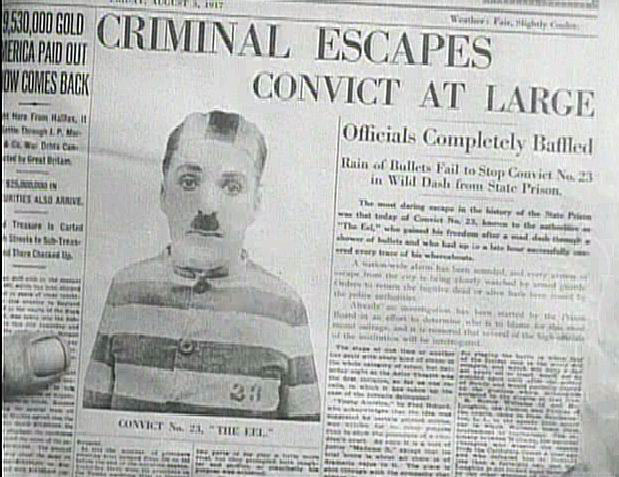
The police are after an escaped convict (Chaplin) who appears out of the
sand beside a resting prison guard(Frank J. Coleman). Soon five guards
are chasing Charlie over and through the hills and crags of the rough
seacoast. The chase ends with Charlie taking to the ocean where he steals a
swim suit from a boater. Meanwhile Edna Purviance and her suitor Eric
mother who has fallen off the pier into the ocean. Edna begs Eric to jump
in and rescue her, but he refuses to risk his life and instead can only
stand on the pier and cry for help. Edna bravely jumps in, but is no better
a swimmer and is soon also yelling for rescue. As Eric yells from the pier
a swarthy seaman standing next to him yells along, and in the process
breaks the railing, plunging them both in the drink. Charlie has meanwhile
swum to shore but hearing the cries for help, swims to the pier where
mother, daughter and Eric are all treading water. The Little Fellow swims
agilely between the three, deciding who to save first. He rescues Edna, who
sends him down again for her mother and then for Eric, whom Charlie tows
along to the pier by his beard. The ladies' chauffeur (played by Chaplin's
own chauffeur, secretary and valet Toraichi Kono) aids in helping the
ladies to their limousine, where Charlie explains that he heard their cries
"from my yacht". When Eric is accidentally dumped back into the sea by
Charlie, he foils Charlie's second rescue by kicking him off the ladder to
the pier. At Edna's orders, Kono discovers the unconscious Charlie and
carries him to the car.
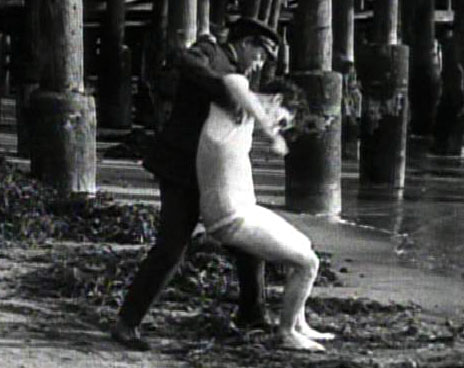
Waking in a strange bed with bars on the headboard
and dressed in someone else's striped pajamas, Charlie thinks he's back in
prison until the butler enters with clothes for him. A party is under way
in the household. The hero of the day introduces himself as Commodore Slick
and meets Edna's father, Judge Brown, who eyes him suspiciously. Charlie is
very interested in Edna, but also in all the free drinks. His rivalry with
Eric soon escalates into covert kicking and seltzer squirting, until Eric
finds Charlie's picture in a newspaper article about his escape. Before
Eric can bring the article to Judge Brown's attention, Charlie cleverly
draws
be denied,
pleasures of the house, dancing with Edna and eating ice cream on a
veranda. In a classic bit of pantomime, when Charlie accidentally drops
his lump of ice cream down his pants front, we can trace the exact position
of the freezing lump just by watching Chaplin's face. When the guards
arrive, a marvellous chase sequence begins, upstairs and down, during which
Charlie eludes capture. Jumping down from the balcony, one of the guards
grabs Charlie who has paused to apologize to Edna for his deception. When
the guard loosens his hold to shake hands with Edna, Charlie takes to his
heels again as the picture ends.
This last of Chaplin's twelve short masterpieces marked the end of
Chaplin's most intensively creative period. "Fulfilling the Mutual
Contract, I suppose, was the happiest period of my career, he wrote. "I was
light and unencumbered, twenty-seven years old, with fabulous prospects and
a friendly, glamorous world before me. Within a short time I would be a
millionaire. It all seemed slightly mad." Eric Campbell, who holds a
special place in the Chaplin lexicon, appeared in only eleven Chaplin
films. He was tragically killed in an auto accident in December, 1917 at
age 37. Chaplin tried and failed to replace
his approach to the villain in his films, later to be supplanted by aspects
of society at large. Chaplin's David was never the same without his true
Goliath.

Chaplin's Goliath, the great Eric Campbell
Cast
Charles Chaplin - Convict #23, aka The Eel, aka Commodore Slick
Edna Purviance - A Girl
Henry Bergman - Her Father, Judge Brown and a Docker
Eric Campbell - Her Suitor
Janet Miller Sully - Her Mother
Albert
Austin -
Frank Coleman - Prison Guard
Loyal Underwood - Small Guest
May White - Large Female Guest
Toraichi Kono - Chauffeur
Production Team
Charles Chaplin - Director, Producer, Writer
Roland H. "Rollie" Totheroh - Cinematographer
Continue to the First Nationals
c)1995-2008 Phil Posner
